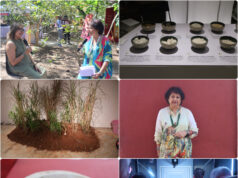A shocking 68 billion kilograms of food are wasted in Indian households every year, which translates into every person generating approximately 50 kgs of food waste annually. According to Radhika Khandelwal, chef and food security activist, there is an immediate need to utilise every part of the plant or animal that we consume as well to repurpose food scraps to reduce the overall food waste generated.
Khandelwal, who facilitated the ‘Zero-Waste Cooking Workshop’ curated by chef Thomas Zacharias and The Locavore Team at the ongoing Serendipity Arts Festival 2023, educated participants on the importance of safe food storage in an attempt to change their perception of what does and does not constitute food scraps.
“By embracing the efficient use of ingredients, we not only reduce environmental impact but also redistribute valuable resources, ensuring better nutrition and creating a more equitable and sustainable food system for vulnerable populations worldwide,” said Khandelwal.
She said that the food sector in India, which generates a staggering 11.9 million tonnes of food waste annually (most of which ends up in landfills, contributing to excessive methane emissions and soil contamination), can also significantly benefit from repurposing what is generally perceived as food waste by thinking of innovative and experimental cooking methods.
“Restaurants can potentially save a significant amount of revenue by innovatively repurposing food waste. Embracing the notion that scraps are indeed edible and valuable ingredients, opens doors to creating profitable dishes out of what is conventionally seen as waste,” she said, demonstrating the same by teaching participants how to make kimchi, a spicy fermented Korean vegetable dish, made from vegetable peels.
Khandelwal heavily promotes the total utilisation of every part of an animal or plant for consumption out of respect for the resource and its alignment with sustainability principles.
“By embracing the efficient use of ingredients, we not only reduce environmental impact but also redistribute valuable resources, ensuring better nutrition and creating a more equitable and sustainable food system for vulnerable populations worldwide. By efficiently redirecting this surplus to those in need, we can contribute significantly to alleviating hunger and undernourishment,” she stated.
According to Khandelwal, quantifying the actual savings by repurposing food scraps, would depend on factors like the volume of waste repurposed and consumer reception, “but such initiatives showcase the economic viability of innovative waste repurposing in the culinary industry.”
There is a need for what truly constitutes food waste to be defined explicitly, which is what Khandelwal strove to do during the workshop.
“The term ‘food waste’ inherently implies food intended for human consumption that is now discarded due to inefficient utilisation. Food waste not only denies access to nutritious meals but also perpetuates hunger in communities where food access is limited,” said Khandelwal.
Surprisingly, in a state where rice, curry and fish are beloved by all and so is the humble bread, the most commonly discarded food items in Goa’s restaurants and eateries are bread and cereal grains, stated Khandelwal.
“Due to their perishable nature and the high likelihood of surplus, bread, rice and other grains often contribute significantly to the overall food waste in these establishments. Factors such as overestimating demand or improper storage can lead to excess quantities of these staple items being discarded, making them among the primary sources of food waste in Goan eateries,” said Khandelwal.







